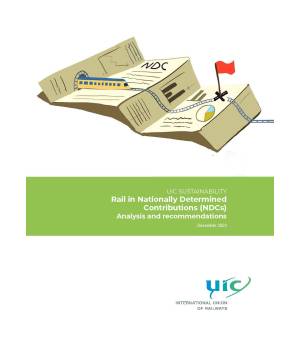
Rail in Nationally Determined Contributions (NDCs) - Analysis and recommendations
Despite global efforts to limit global warming to 1.5°C, in 2022, global CO2 emissions from the transport sector reached nearly 8Gt CO2, accounting for more than a third of emissions from end-use sectors. At the same time, being on track for the Net Zero Emissions Scenario would require transport emissions to fall by approximately 25% by 2030, even if demand grows as anticipated1.
Rail can play a key role in curtailing emissions from the transport sector, while ensuring access and connectivity for people and goods. Rail currently transports around 7% of global passenger-kms and 6% of tonne-kms but only accounts for around 1% of transport emissions2. Rail must increase its modal share, and doing so requires a concerted and coordinated effort from governments through Nationally Determined Contributions (NDCs). These are country-specific, short to medium-term, politically backed commitments and can help to drive mitigation and adaptation towards the Paris Agreement’s climate goals.
For this report, all of the latest 168 NDCs representing 195 Parties (with the EU-27 all using the same document)3 were analysed in terms of the commitments made by countries regarding the rail sector. It was found that only around 25% of the Parties mention rail as a climate solution and that only 10% have specific targets, usually referencing specific infrastructure projects and estimating the CO2 emissions avoided. The Parties who do reference rail are showing commitment through rail network expansion, modal shift targets and the electrification of both passenger and freight transport. Rail is also rarely mentioned in terms of adaptation and resilience despite it being vulnerable to extreme weather conditions.
Additionally, very few countries clearly state how they intend to finance the projects or the government body responsible for monitoring progress. NDCs can be a powerful tool to encourage international cooperation and will be key for the carbon markets established by Article 6 of the Paris Agreement.
Although countries have vibrant rail projects as part of their national transport strategies, they are not always mentioned in their NDCs. Bridging that gap, and increasing aspirations for and the specificity of rail measures in the next cycle of NDCs is given as part of this report’s recommendations.
UIC is working together with UITP and Walk21 on a shared template and a capacity building programme for improving NDCs for active travel and public transport, including rail, and interested parties are invited to reach out to these organisations if they interested in learning more about these initiatives.
| Auteur | UIC |
| ISBN | 978-2-7461-3342-6 |
| Pages | 22 |
Fiche technique
- Langage
- Anglais
- Format
- Téléchargeable
- Edition
- Ed. no.1
- Date d'édition
- 01/12/2023
- Date de publication
- 13/02/2024
- Nombre de pages
- 22
- Thème
- Environment Environnement
- sku
- 5-23018E-PDF
- Reference
- 5-23018E
 Préférences sur les cookies
Préférences sur les cookies

